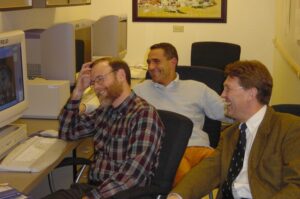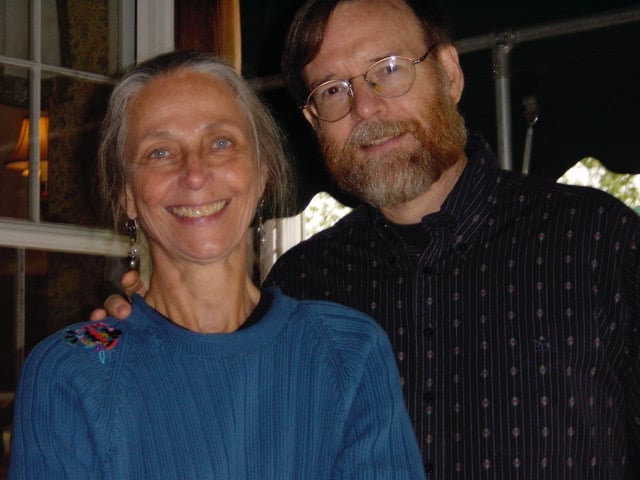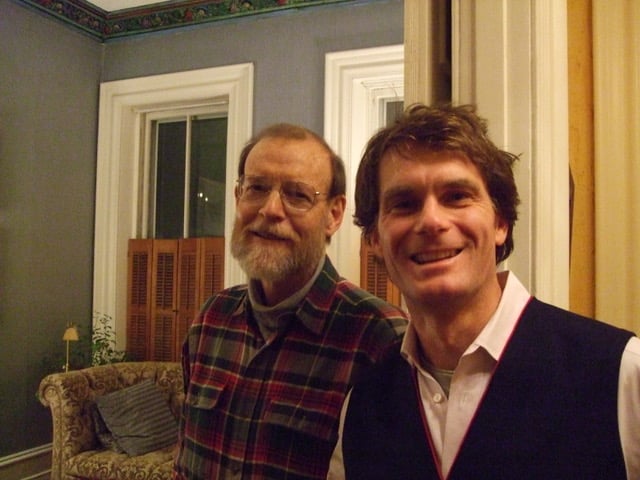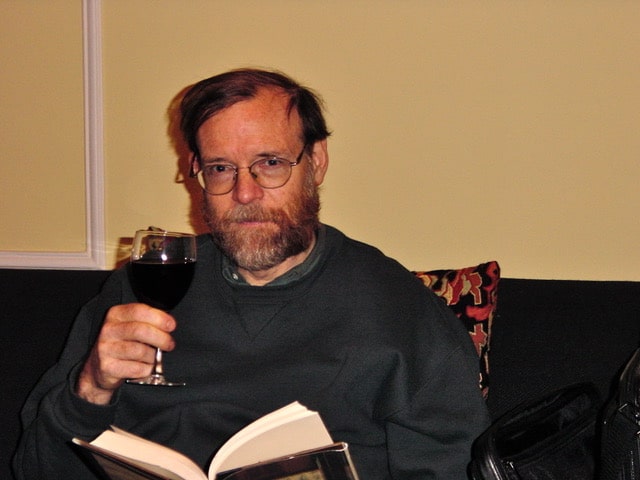By Meghan McCarthy
Anne Clark rarely discussed work with her late husband, Chris. While both had successful careers, their 35-year marriage was centered on quality time.
Yet after Chris passed, Anne was tasked with cleaning out his office desk. Methodically, she worked to organize the space. Hidden within a desk drawer, one folder stood out. Quotations, it read. Inside, Chris filed a single John Lennon lyric:
“There are no problems, only solutions.”
In the eleven years since his passing, Anne lives by this sentiment to honor Chris’ legacy.
Christopher M. Clark, MD, was a pioneer in the world of Alzheimer’s disease (AD) research and care. After accepting a faculty appointment in the Department of Neurology at the University of Pennsylvania in 1990, Chris led the Clinical Core of the Alzheimer Disease Center (ADC). He also served as a founding member of the Penn Memory Center (PMC), which he directed.

Chris with Philip Scheltens, MD, PhD, (Founder of Alzheimer’s Center at the University Medical Center in Amsterdam) and Giovanni Frisoni, MD, (Director of Memory Clinic at Geneva University Hospital)
Under his leadership, Chris’ research team showed PET scan’s ability to detect brain deposits of beta amyloid, a protein that is now considered a hallmark for AD. Amongst his many contributions, he was skilled in developing early and reliable methods of AD diagnosis, reflected in his co-development of the Dementia Severity Rating Scale.
Embodying his valued quote, Chris devoted his life to finding innovative diagnostic solutions within AD.
Amongst his peers, Chris was highly respected and beloved collaborator.
Marianne Watson, RN, began her nursing career with Chris in 1993 and ultimately worked with him for 25 years.
“Everyone loved Chris,” she said. “He had great camaraderie with leaders of centers throughout the United States. I think this was because he was so understated, kind, and warm.”
To staff, Chris was a patient and devoted teacher. He was kind, humble, funny, and organized. Through being quiet, Chris created space to listen sincerely. A trusted confidant to many, Chris was a patient leader who mentored budding scientists in the neurodegeneration field.
Beyond his character, Chris was known for wearing a fanny pack to work, which he filled with lab samples at the end of each day.
“Chris biked everywhere,” said Marianne. “At the end of the day, he’d put test tubes in his leather fanny pack and biked to drop off the samples before going home.”
Chris’ collaborations were anchored by a deeply driven work ethic, yet, he always prioritized family time.
Anne, a fifth-grade teacher, worked with young students in Philadelphia during their marriage. Despite long workdays, Chris always made sure to get home in time to eat dinner with Anne.
Outside of work, he loved to garden, ride horses, and read — so much so that he avoided the distraction of reading when he had an impending work deadline.
Chris died in 2012 at the age of 65 after a diagnosis of sarcoma. But Chris had first made it clear that he didn’t want to have a memorial service, concerned he’d get too much credit for shared work. “Chris didn’t work for the glory,” Anne said. “He had little ego, even though he was brilliant.”
Beyond professional collaboration, Chris had a close personal relationship with Jason Karlawish, MD, now a co-director of Penn Memory Center. The pair spent many holidays together.
In 2020, PMC’s scholars program was renamed the Christopher M. Clark Scholars Program in honor of his legacy.
“We seek to nurture and support the best minds and to instill in them the virtues Chris lived,” said Karlawish. “He understood the value of listening, tolerance, and a consistent and unwavering commitment to professional ethics.”
Since then, the program has supported 12 former scholars and has a current class of six scientists.
While they have diverse interests and skillsets, all Clark Scholars embody Chris’ dedication to improving the lives of persons living with neurodegenerative diseases and their families.
Like Chris, they seek to find solutions.
Amongst many accomplishments, Clark Scholars have gone on to conduct research at the Mayo Clinic, earn national awards for leadership, and become lecturers at prestigious universities.
“Chris would be delighted to know there are Chris Clark Scholars who continue to share his dedication to the research of Alzheimer’s,” said Anne.
Anne Clark continues to support the program through generous donations.





